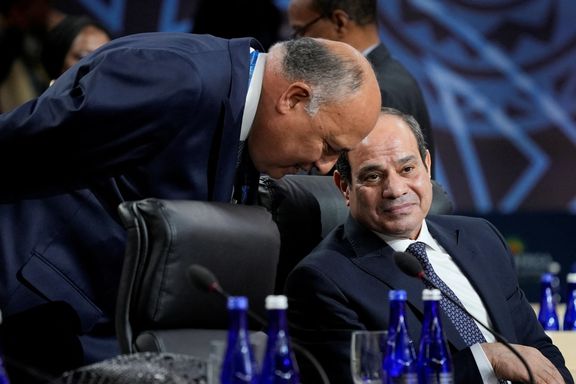Saudi, Egyptian Ministers Vow Cooperation In All Fields, Including Iran

Saudi and Egyptian foreign ministers meeting in Riyadh Thursday stressed the importance of Iran maintaining commitments not to develop nuclear weapons.

Saudi and Egyptian foreign ministers meeting in Riyadh Thursday stressed the importance of Iran maintaining commitments not to develop nuclear weapons.
Prince Faisal bin Farhan al-Saud and Sameh Shoukry released a statement calling on Tehran to abide by its obligations under the Nuclear Non-Proliferation Treaty (NPT), which commits signatories to the solely peaceful application of nuclear technology.
While stressing its continued adherence to the NPT, Iran has breached the limits set by the 2015 nuclear agreement, the JCPOA (Joint Comprehensive Plan of Action), from which President Donald Trump withdrew the US in 2018. It has also substantially reduced monitoring of its nuclear facilities by UN’s International Atomic Energy Agency, the IAEA.
The Saudi energy minister Prince Abdulaziz bin Salman al-Saud announced Wednesday that Riyadh intended to use domestically sourced uranium to power its future nuclear industry, and that recent exploration had revealed rich deposits. Saudi Arabia, half of whose electricity currently comes from fossil fuels, is expanding solar energy but has also invited international interest in building its first nuclear power plant, with Russia’s Rosatom among those expressing interest.
Using domestic uranium for generating electricity would require enriching the naturally occurring material to 5 percent purity, the beginnings of a process that can produce ‘weapons grade’ uranium enriched to 90 percent. Saudi Arabia signed the NPT in 1988, but several leaders, including Crown Prince Mohammad bin Salman al-Saud, have said Riyadh would develop nuclear weapons if Tehran did.
While Iran find itself in more isolation in recent months, due to international condemnations over its deadly suppression of protests and supplying drones to Russia, officials in Tehran claimed earlier this month that there is a chance for improving ties with Egypt. However, Cairo has remained silent on the issue.
Saudi Arabia and Egypt have drawn closer politically since the ‘Arab spring’ revolts of 2010-13. The statement issued by the foreign ministers Thursday said the two countries had agreed to “support Arab efforts to urge Tehran to not interfere in the internal affairs of regional countries, preserve the principles of good neighborliness, and spare the region from all destabilizing activities, including supporting armed militias and threatening maritime navigation and international shipping lines,” the semi-official Arab News reported.
Riyadh last year extended Cairo a $5-billion aid package. Egypt faces a severe financial challenge including loss of tourism revenue and rising food prices resulting from the Ukraine war, with the International Monetary Fund recently identifying a $17 billion fiscal gap that will require international support in coming years. Public debt is around $400 billion and a third of Egyptians live in poverty.
Egypt, which has seen some US aid blocked over ‘human rights’ concerns, took part in the US-sponsored ‘Negev summit’ last year with Israel and the Arab states – Bahrain, Morocco, and the United Arab Emirates – that ‘normalized’ relations with Israel in 2020. Saudi Arabia has kept to the long-standing Arab League position that normalization requires recognition of a Palestinian state, a goal receding as the new government in Israel aims to speed up Jewish settlements on occupied land.